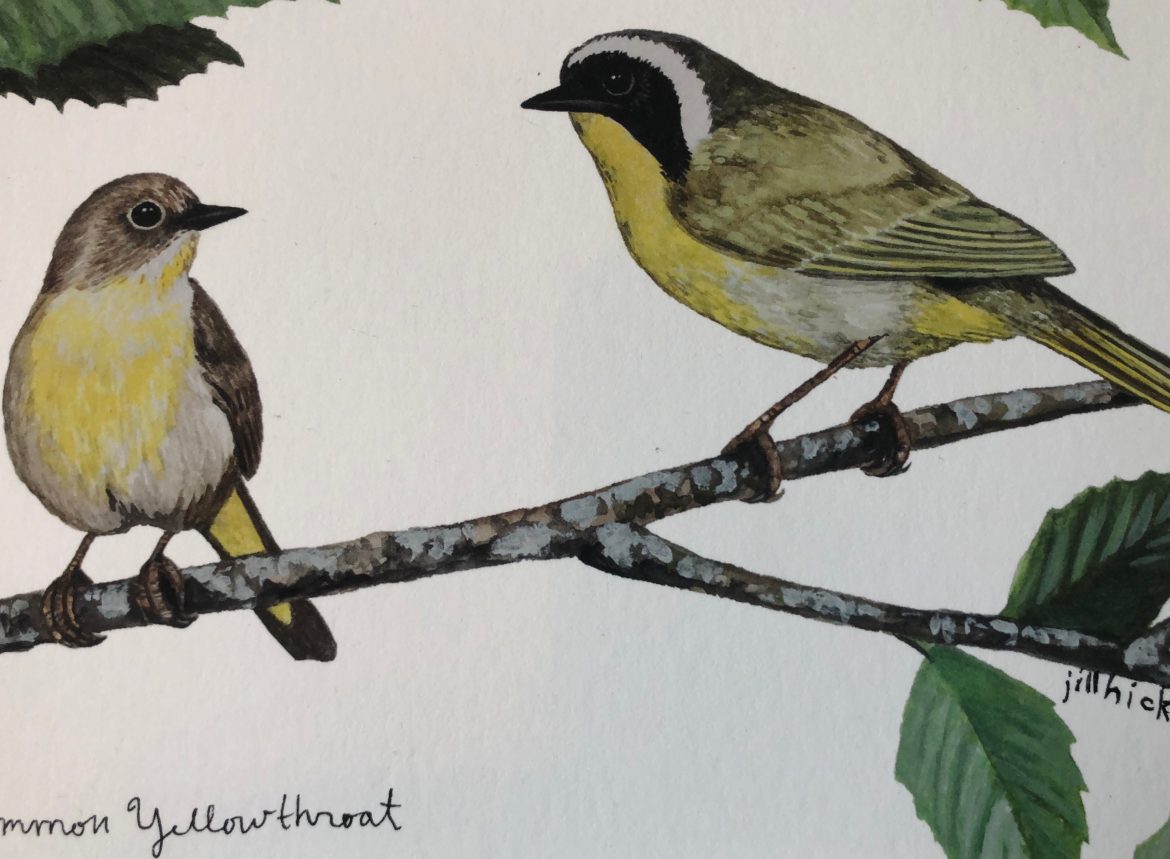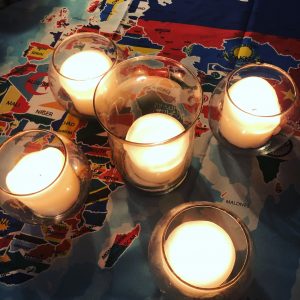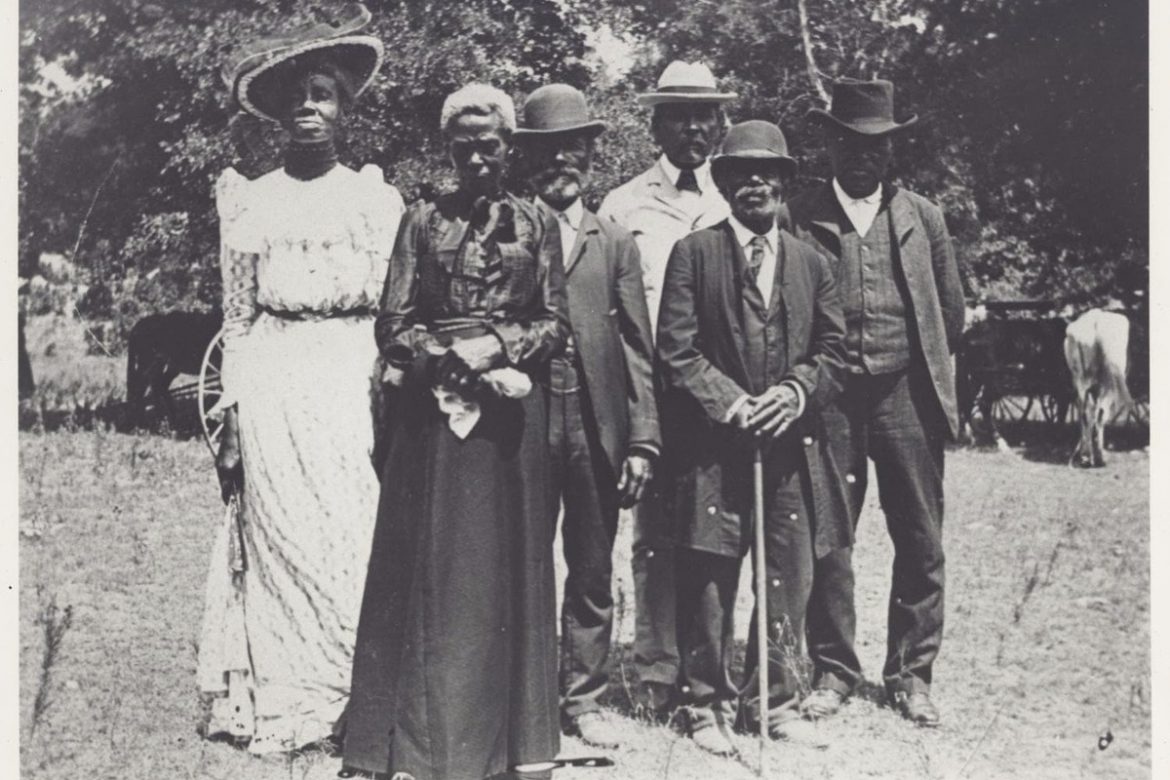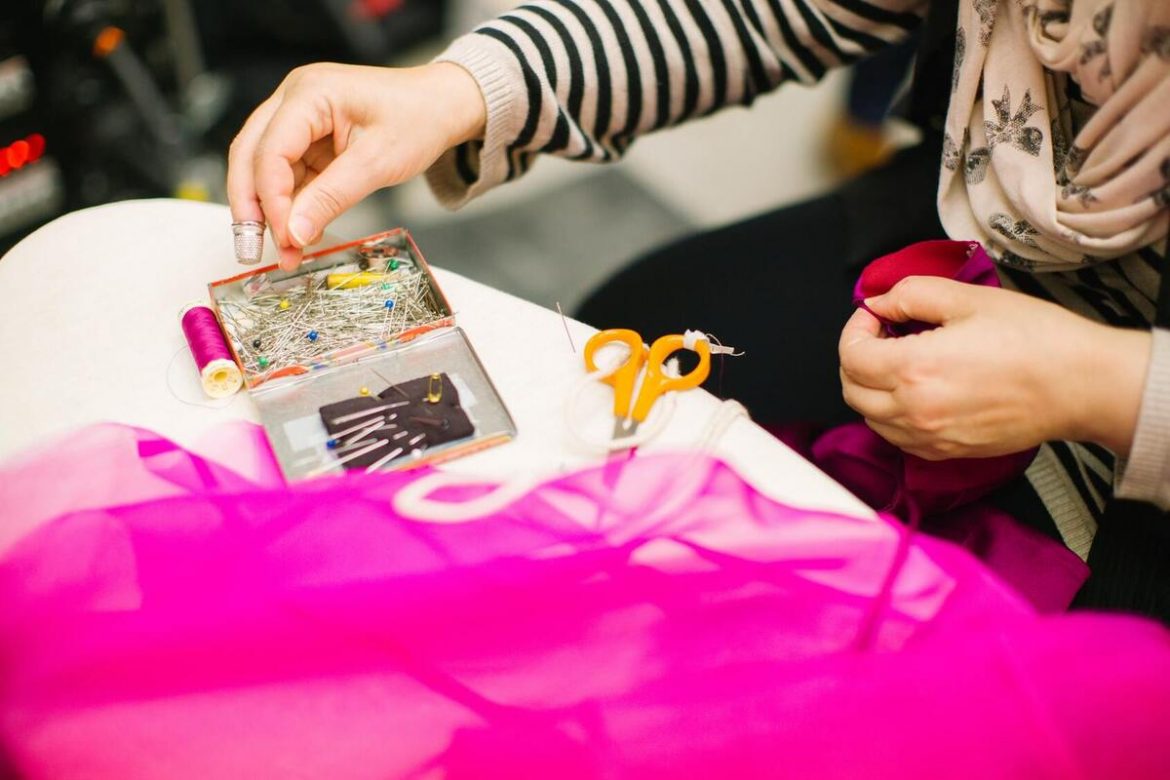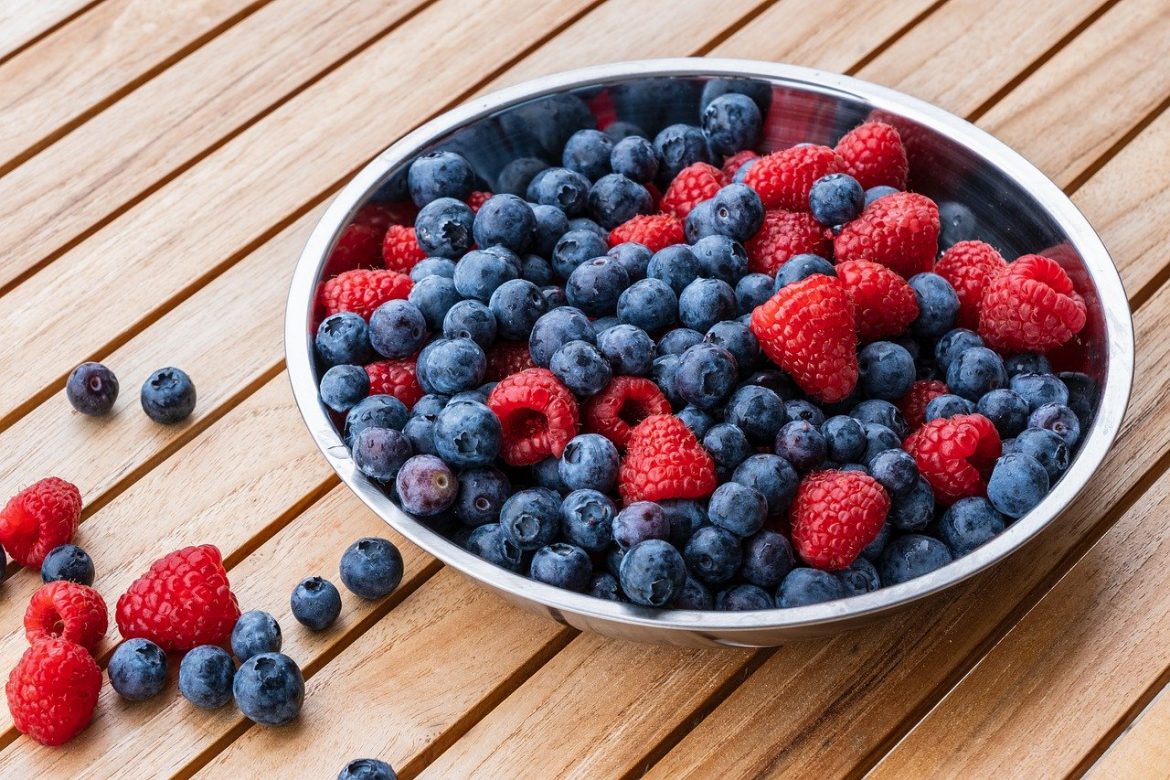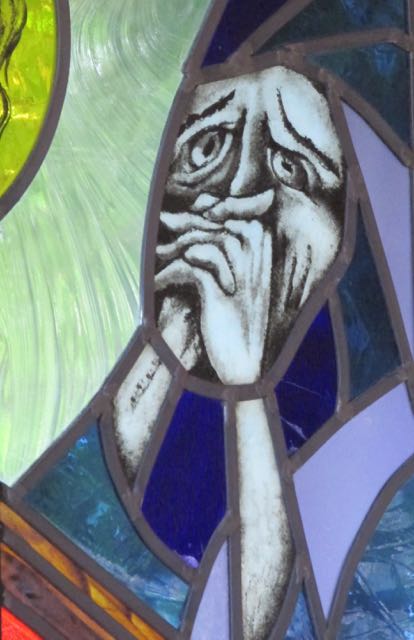Last week’s FreerangeFriday post was an example of the liturgy we use at thinplaceNASHVILLE and I’m continuing that this week along with an invitation to join us on Friday’s at 1pm central time via Zoom. If you need a break in your day, or you are feeling tired or burned out, or just want to experience a more interactive way to worship online, come join us. You also can use the hand out thinplaceWKofJUNE14AGAIN for your own devotions, or with your church community or small group. This week’s gospel reading is Matthew 10: 24-39 in the lectionary. We decided to combine this week and next’s readings and listen to, and reflect on Matthew 10: 24-42. Grab a cup of cold water and your hairbrush and pray with all your senses!
OPENING PRAYER CANDLES (Pray /repeat after leader)
Lord we ask you to fill us with your Hope
Lord, fill us with your Peace
Lord fill us with your Joy
Lord, fill us with your Love
And Lord Help us to see your Light! AMEN
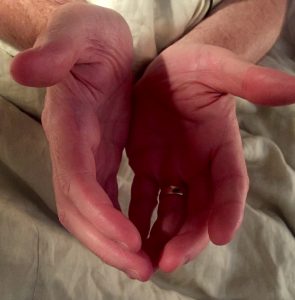
GIVING STUFF TO JESUS to HOLD FOR US: (body prayer practice)
We are all carrying many heavy things today… let us give them to God to hold and carry for us. Cup your hands in front of you and imagine all the heavy things your are holding…feel the weight. Now give these things into the hands of God to hold and carry for you today. And know God will hold them and be in charge of them, you don’t have to carry them anymore.
Praying the Psalm together
Psalm 86:1-11 A Prayer of Faith (from the Passion Translation)
King David’s prayer
1 Lord, bend down to listen to my prayer.
I am in deep trouble. I’m broken and humbled,
and I desperately need your help.
2 Guard my life, for I’m your faithful friend, your loyal servant for life.
I turn to you in faith, my God, my hero; come and rescue me!
3 Lord God, hear my constant cry for help;
show me your favor and bring me to your fountain of grace!
4 Restore joy to your loving servant once again,
for all I am is yours, O God.
5 Lord, you are so good to me, so kind in every way[a]
and ready to forgive,
for your grace-fountain keeps overflowing,
drenching all your lovers who pray to you.
6 God, won’t you pay attention to this urgent cry?
Lord, bend down to listen to my prayer.
7 Whenever trouble strikes, I will keep crying out to you,
for I know your help is on the way.
8 God, there’s no one like you;
there’s no other god as famous as you.
You outshine all others and your miracles make it easy to know you.
9 Lord Almighty, you are the one who created all the nations;
Look at them—they’re all on their way!
Yes, the day will come when they all will worship you
and put your glory on display.
10 You are the one and only God.
What miracles! What wonders! What greatness belongs to you!
11 Teach me more about you, how you work and how you move,
so that I can walk onward in your truth
until everything within me brings honor to your name. AMEN
LISTEN TO THE GOSPEL (LECTIO DIVINA)
We listen to it in three voices and in three translations, The New International Version, The Message, and The Passion Translation.
Matthew 10:24-42 The Message (MSG)
24-25 “A student doesn’t get a better desk than her teacher. A laborer doesn’t make more money than his boss. Be content—pleased, even—when you, my students, my harvest hands, get the same treatment I get. If they call me, the Master, ‘Dungface,’ what can the workers expect?
26-27 “Don’t be intimidated. Eventually everything is going to be out in the open, and everyone will know how things really are. So don’t hesitate to go public now.
28 “Don’t be bluffed into silence by the threats of bullies. There’s nothing they can do to your soul, your core being. Save your fear for God, who holds your entire life—body and soul—in his hands.
29-31 “What’s the price of a pet canary? Some loose change, right? And God cares what happens to it even more than you do. He pays even greater attention to you, down to the last detail—even numbering the hairs on your head! So don’t be intimidated by all this bully talk. You’re worth more than a million canaries.
32-33 “Stand up for me against world opinion and I’ll stand up for you before my Father in heaven. If you turn tail and run, do you think I’ll cover for you?
34-37 “Don’t think I’ve come to make life cozy. I’ve come to cut—make a sharp knife-cut between son and father, daughter and mother, bride and mother-in-law—cut through these cozy domestic arrangements and free you for God. Well-meaning family members can be your worst enemies. If you prefer father or mother over me, you don’t deserve me. If you prefer son or daughter over me, you don’t deserve me.
38-39 “If you don’t go all the way with me, through thick and thin, you don’t deserve me. If your first concern is to look after yourself, you’ll never find yourself. But if you forget about yourself and look to me, you’ll find both yourself and me.
40-42 “We are intimately linked in this harvest work. Anyone who accepts what you do, accepts me, the One who sent you. Anyone who accepts what I do accepts my Father, who sent me. Accepting a messenger of God is as good as being God’s messenger. Accepting someone’s help is as good as giving someone help. This is a large work I’ve called you into, but don’t be overwhelmed by it. It’s best to start small. Give a cool cup of water to someone who is thirsty, for instance. The smallest act of giving or receiving makes you a true apprentice. You won’t lose out on a thing.”
QUESTIONS TO CONSIDER and Journal from this week:
After reading or listening to the psalm and the gospel passage, what do you notice that you haven’t noticed before? What is God speaking to you about TODAY as you read these passages? Take time to read them again, use different translations to hear it in fresh ways.
What questions do you have? What questions come up as you read the passage. Talk to Jesus about them.
How are you in need of help today? What are you crying out to God about today? What prayers do you want God to listen to right now?
How can you see God as your hero? (from the Psalm)
Considering all that is happening in our world right now, what things that are in the dark, do you want to be brought into the Light?
“Stand up for me against world opinion and I’ll stand up for you before my Father in heaven.” How can you stand up for Jesus and his kingdom work in the world right now? Pray about this and ask Jesus to show you.
Have you ever denied Jesus in front of people? Talk to him about this and if you still are carrying any guilt or shame, give this to Jesus to carry for you and ask him to forgive you.
“Well-meaning family members can be your worst enemies.” Do you have conflict with anyone in your family? Talk to Jesus about this. Take time to pray for your family members or friends with whom you have conflict, being reminded we are called to LOVE OUR ENEMIES and pray for those who persecute us.
“So don’t worry. For your Father cares deeply about even the smallest detail of your life. How does it feel to know that God the Father, Creator God, cares so deeply for you that God knows the number of hairs on your head?
RESPONSE: HOLD your cup of water in your hand… What things have been “cups of cold water” for you this week? Name them. What things have given you refreshment in the midst of this crazy season? Take time to thank Jesus for these things. Who are the people who’ve provided “cups of water”for you during the middle of covid19? Spend some time praying for these people to be refreshed by Jesus.
RESPONSE 2: How can we give away cups of water?
How can we give more “cups of cold water” to people in the days ahead? What does this look like in the middle of covid19 and the Black Lives Matter movement? Ask Jesus to show you! Make a plan. What are some practical ways you can do this in your neighborhood and with your friends and family?
CLOSING PRAYER:
Lord!
Give us grace today to love as you love.
Help us to love with extravagance.
Give us hope today for ourselves and others.
Heal our hurts and our hearts today,
So we can serve and help those around us.
Help us to know that you are enough.
And help us live today and everyday in thankfulness.
For all you’ve done and for all you bless us with.
In the Name of the Father, the Son, and the Holy Spirit. AMEN
HOMEWORK: Ways you can respond to and worship with this passage throughout the week!
PRAY WITH THE BIRDS: Watch for Sparrows/ Birds this week! Allow the birds to remind you of God’s great care and compassion for you! Remember that Jesus cares about the details of your life! You are worth more than a MILLION CANARIES!
PRAY WITH YOUR HAIRBRUSH: As you comb, brush, “do” your hair this week, take time to thanks Jesus for his care for you! Allow Jesus to love you as you do your hair. He knows and loves you so much that he counts the number of hairs on your head! Pray for yourself to receive this gift of love and pray for someone else who needs to know this care and love of Jesus. 
PRAY WITH ART: The ART above is by my friend Jill Hicks “common yellow throat” Use it as a reminder that Jesus is caring for you and watching over you! Create your own art work in response to this passage!
LISTEN: Listen to Father Richard Rohr’s sermon on this same passage! He can say more in 6 minutes than some people can say in 6 hours!
WATCH: Watch my friend Scott Erickson’s sermon on Hope (starting 20 minutes into the video) it’s great!
LISTEN AND SING: Listen to this beautiful version of “His Eye is on the Sparrow”. Learn more about the song here.
thinplaceWKofJUNE14AGAIN (HANDOUT PDF)
by Lisa DeRosa
Tomorrow, June 19th, is Juneteenth, a celebration of the true freedom of slaves in the US. This year, we celebrate 155 years since June 19, 1865. Instead of me trying to convey what this celebration is and means, I want to point you to resources so you can discover for yourself. In this time, we must be listeners and learners. I hope these resources help you discover something new that you may not have known before as they have done for me.
Websites for the History
Junteenth.com shares the extensive history behind this day of celebration including the historical and cultural reasons for why freedom took so long after the Emancipation Proclamation.
This New York Times article from Monday includes the relevancy of our current Black Lives Matter movement in the context of this holiday.
Also, check our History.com for their take on Juneteenth and more information.
An article unrelated to Juneteenth, but just a lovely interview with Alice Walker, author of The Color Purple by YES! Magazine.
Videos
How to Celebrate!
Juneteenth.com provides a diverse array of ways to celebrate at work, in your community, and at home. Based on where you are and what phase of reopening you are in, there are ideas for all! Consider a Zoom gathering with friends and family where you can talk about issues of slavery and race. Put up a sign in your neighborhood to raise awareness! I plan to make a special meal with my husband that includes biscuits with cheddar and green onions (from the garden) while we discuss how to respond with compassion to the Black Lives Matter movement from our privilege as a middle class white couple.
If you have celebrated Juneteenth before, what are some ways you have celebrated? Or is this your first year celebrating Juneteenth like me? Wherever you are in the awareness of this holiday, let’s not let it go by like any other Friday. Let’s choose to not only educate and understand, but celebrate together the freedom of African Americans from slavery in the US.
By Diane Woodrow – Guest post
2020 they said was the going to be the year of perfect vision – Twenty twenty vision! Then they panicked because suddenly we were all locked inside, unless we were key workers. Suddenly they were talking about how this lockdown/pandemic had been predicted before. Lots of prophecies bouncing out. But not once, at least on the ones I listened to, did I hear anything about this 20/20 vision.
Let me list the things I think this year of 2020 is revealing: (these are in no particular order so apologies if some look like they are of more importance. That is not my intention)
- who the key workers really are. Not just health and care workers but delivery drivers, both food and parcels, those who empty the bins, not just our household ones but the ones in the parks and streets, the takeaway food and coffee workers, those who work in food producing factories. I’m sure I’ve missed some.
- the fragility of the world economy
- poverty and how people teeter on the edge and losing 20% of their wages pushes them over the edge
- the huge one that is causing riots and protests across the world – including social media infiltrations via K-Pop fans – is racism. Not just slurs and comments but institutionalised racism.
- But this is also showing how connected the world is and how people don’t agree with all that is going on and will speak out, will do something. And perhaps it is because so many are at home and have time to do something about it. I am seeing websites starting gathering info, people doing things they would not have had the time or energy to do.
- Not forgetting climate change
- Domestic violence
- Child abuse – interesting how during this time Police say they may have found the real abductor of Madeline McCann which happened so many years ago. Things coming into the light, things being truly seen
mental health issues - the fragility and incompetence of our government and other governments around the world
- the strange system in the USA where one man speaks for all no matter how sound he is
But you know what? All these issues have been raised before. It seems not so long ago another middle aged black man was crying out “I can’t breath” but things did not explode like they have done. It did not become a worldwide thing. Why now? Some say it is because people have less to do, but I would like to raise the issue of 20/20 vision, the prediction that this year we would see things clearly.
It looks too like I might not be the only one thinking this. Here is this great poem by Leslie Dwight going around which says:
“What if 2020 is the year we’ve been waiting for?
A year so uncomfortable, so painful, so scary, so raw —
that it finally forces us to grow,”
“A year that screams so loud, finally awakening us
from our ignorant slumber.
A year we finally accept the need for change.
Declare change. Work for change. Become the change.”
“A year we finally band together, instead of
pushing each other further apart.“2020 isn’t cancelled, but rather
the most important year of them all.”
[accessed 5th June 2020]
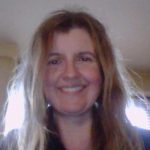 “I’m Diane. In 2007 I married Ian and he took on not just me but my two children who I was homeschooling. I was a single mother for nearly 10 years and for some of that time my children and I were part of Ywam Scotland. Now my son in the army and my daughter, after having done her degree in London, is living in Cardiff. In 2016 Ian and I left his 3-bed house in Wiltshire and bought a 6-bed house in North Wales where I have found my spiritual home. From here, when life was “normal” I rented out rooms in our house via Airbnb, etc, and ran creative writing workshops. I love to spend my days writing, reading, taking my dog for long walks on the beach and in the hills around our house, and keeping in touch with my friends.”
“I’m Diane. In 2007 I married Ian and he took on not just me but my two children who I was homeschooling. I was a single mother for nearly 10 years and for some of that time my children and I were part of Ywam Scotland. Now my son in the army and my daughter, after having done her degree in London, is living in Cardiff. In 2016 Ian and I left his 3-bed house in Wiltshire and bought a 6-bed house in North Wales where I have found my spiritual home. From here, when life was “normal” I rented out rooms in our house via Airbnb, etc, and ran creative writing workshops. I love to spend my days writing, reading, taking my dog for long walks on the beach and in the hills around our house, and keeping in touch with my friends.”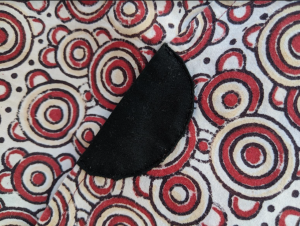
photo by Lisa Scandrette
The hem on one of my favorite skirts tore; it is made of a block print, a gift from a friend. For a while I wore it that way—the skirt is full, the tear is not large, and I would forget it was torn until I put it on again. Recently I was preparing to travel and I wanted to take this skirt along. This time, I remembered that it needed some loving attention. I decided to repair it using visible mending—a method of repair that embellishes items rather than trying to make repairs invisible. I cut out a black circle from some scrap fabric, echoing the pattern of the print, folded it over the edges of the tear and sewed it down along the edges. I love my little patch—so much so that I fingered that little patch over and over the first time I wore the skirt again, admiring its clever presence on my hemline.
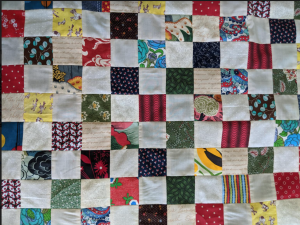
photo by Lisa Scandrette
I’ve also been assembling a scrap quilt from leftover fabrics. When I was little, my mother had a number of scrap quilts that we called “nap blankets”. Rather than crawling under the covers for a nap, I would lay on top of the bed covers and my mom would cover me with a nap blanket made from bits and pieces left over from sewing clothes. So when I was outgrowing my naps, I would often lay there and search the blanket for pieces of my shirts, my sisters dresses, and favorite fabrics I recognized until rest time was declared officially over. The scrap quilt I am making holds similar memories from leftover projects—birthday banners for nephews and nieces, a costume for my daughter, Christmas gifts and thrifted scraps all reimagined into a new blanket. It’s not coming together rapidly. Rather, it builds two inch square by two inch square and then row by row until it’s big enough to cover someone I love.
An author I read recently argued that we need to become more materialistic rather than less. The words startled me to attention, opposed to what I would usually think. The author went on to explain that perhaps we need to learn to really love the things in our care—to tend them, enjoy them, mend them, pay attention to them rather than letting our attention float so quickly to new items. I’ve been contemplating that in regard to the things in my possession. I often think that the next new thing will be so satisfying and engaging, but neglect to fully enjoy and engage with the last thing I brought into my home.
During this time of COVID-19 sheltering, I have had the opportunity to dive even more deeply into fully appreciating and finding contentment in what already surrounds me—using things, creating from scraps, repairing things, living more softly on the earth. When I think of mending, patching, altering or of creating beauty from scraps or discards, I often think of Jesus. Jesus was all about making the broken whole, lifting those discarded by society, naming their value, making beauty from the most unlikely things, reimagining a more whole way of being in the world. Restoration is holy work—the work of making repairs, of restoring, of reclaiming. It’s also slow work. I love instant results and for things to come together quickly, but Jesus was never in a hurry, and transformation, both of souls and of material goods, takes time, persistence and patience. As I slowly work with my hands, I contemplate what slow work I am allowing Jesus to do in me, asking what he might be restoring, what he might be piecing together in more whole and beautiful ways. What slow work of restoration am I being invited to join in?
What is already around you that you can enjoy? What can you breathe new life into? What is the work of restoration that is yours to do?
by Christine Sine
Over the last couple of weeks everyone at the Mustard Seed House has been hungrily devouring the strawberries in our front yard. And soon will come the raspberries and blueberries and cherries. In each case, there are not many of them, but these first fruits of the season taste the best of any fruit you will ever get out of the garden, partly I think because there are so few of them and they have been long anticipated over the winter. As you can imagine, I am tempted to eat them all myself yet I know that I need to share these “first fruits” and each day try to give another member of our small community at least a couple of these delectable fruits.
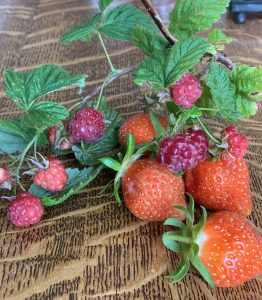
Living in anticipation
First fruit are always held in high regard in the Bible too. In Deuteronomy 20:6 we read, “has anyone planted a vineyard but hasn’t enjoyed its fruit yet? Go back to your house because if you did in this battle, someone else would be the first to enjoy its fruit.” Wow. That is high regard indeed but what delight to think that this first produce was so highly valued that it was a reason to stay home from war.
What must have been particularly challenging was the command to give some of these first fruits to the priests and temple workers (Ezekiel 44:30). Sharing the first fruits of any harvest is always challenging but in agrarian cultures, first fruits came at a time when everyone was lean and hungry, wondering whether their stored goods would last until abundance once more filled the earth. The need to give first fruits to the priests would have been particularly hard on the poor and the marginalized. It seems to me that this principle of first fruits to the priests only works well when it is combined with a culture of sharing and generosity where the whole community makes sure that those who do not have enough are provided for too, not with the dregs but with the best that the community has to offer.
I see this principle throughout the Bible too.
In 2 Kings 4:42-44 we read about the first fruits:
a man from Baal-shalishah brought some food from the first fruits of the harvest to the man of God: in his sack were 20 barley loaves and fresh produce still in the husk.
Elisha: Distribute this food to the people so that they may fill their hungry bellies.
Servant: Do you really think this will be enough for 100 hungry men?
Elisha:Yes, do as I said, and distribute this food to the people. The Eternal One says, “They will fill their bellies and still have some food left over.”
He handed out the food to them; and exactly as the Eternal One said, they ate and had food to spare.
Then from the gospel of John 6:1-21 – the story of the little boy with five loaves and two fish.
The servant and the disciples do the maths, and know it is impossible. They act like hired hands or slaves, not believing in the impossible but obeying begrudgingly, without much joy or hope. They were probably filled with anxiety and the rumbling of their stomachs probably made them resent the crowds around them.
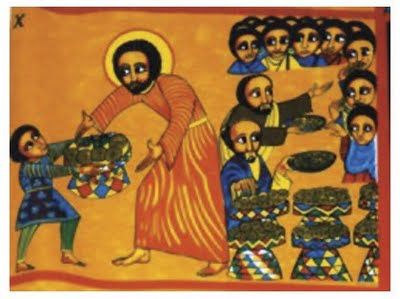 Contrast the little boy, a child – probably surrounded by a flock of friends, all laughing, excited egging him on, like flocks of kids that used to follow us in African villages. They alone believe in the possibility that Jesus can and will perform a miracle. In many ways this little boy’s offering is a first fruits offering too. He doesn’t have much, but what he has, he is willing to give. This is the first time as far as we know that he has given anything to Jesus, something small that Jesus could make big.
Contrast the little boy, a child – probably surrounded by a flock of friends, all laughing, excited egging him on, like flocks of kids that used to follow us in African villages. They alone believe in the possibility that Jesus can and will perform a miracle. In many ways this little boy’s offering is a first fruits offering too. He doesn’t have much, but what he has, he is willing to give. This is the first time as far as we know that he has given anything to Jesus, something small that Jesus could make big.
Today, first fruits may not mean the difference between hunger and a full stomach but there is still something wonderful about them. The first tomato of the season excites taste buds that have not been stimulated since last season and we want more! Surely there is only enough for me (and maybe for Tom.) Yet now we are being asked to share – a paltry amount – nowhere near enough to feed the 8 people in our community let alone 100 hungry men, or a crowd of more than 5,000 hungry men, women and children. It is impossible to believe we can hand it out, feed everyone and still have some left over.
I wonder today as I reflect on these stories “how often do we get caught in an attitude of scarcity because we react as servants rather than as children of God? We look at what we have to offer be it food, or talent, or money and don’t think there is enough for our own needs let alone an abundance to share. We don’t get excited about the possibilities of what God can do and resent God’s invitation to be generous with the first fruits of our labours. We have done the maths and know that there is just not enough for everyone.
Kids are not great mathematicians but they are great sharers and they are great believers in the awe and wonder of miracles. When they see someone with a need they are right there wanting to help and they believe what they have in their hands can make a difference.
What will it take for us to become like children again – excited, expectant and eager to share because we know that in the hands of Jesus the little we have can always be transformed into enough for everyone? The really exciting and awe inspiring thing is that when we begin to share we do see our first fruits multiplied, our excitement grows and we become generous with everything that God places in our hands.
Can you imagine how that kid and his friends must have felt after they watched the huge crowd eat from their little offering? I am sure they talked about it for days if not years afterwards.
So I find myself wondering again: Were some of these kids amongst the early believers in Acts 2:42-47 once more filled with awe and wonder as they now shared meals and possessions together? Did they remember that first time of sharing when they saw Jesus perform a miracle of provision for a great crowd and so believed that he could still multiply their possessions to provide for everyone?
What Is Your Response?
Romans 8:15 tells us that we are not slaves or servants but children of God yet we rarely act as children. We don’t play, get excited or gasp in awe and wonder at the world and its abundance.
Sit prayerfully for a few minutes and think back to your childhood. What is one occasion you remember when you got excited about sharing with others/ How did you feel? What further responses did it stir in you?
What would it take for you to act as a child today? What “first fruit” do you think God might be prompting you to share? How can you respond.
For more reflections one “first fruits” you might like to check out Offer Your First Fruits to God.
Today’s contemplative service from St Andrews Episcopal church in Seattle, with music in the style of Taize contains special prayers and intentions for racial reconciliation and peace.
Carrie Grace Littauer, Prayer Leader, and music by Kester Limner and Andy Myers.
Permission to web stream or podcast music in this service is granted under One License number A-710-756.
Kyrie – Repentance for Complicity
Prayer text by Laura Jean Truman @laurajeanttruman Original post: https://www.instagram.com/p/CA1hxGThdKX/
Adapted and composed by Kester Limner and Andy Myers, shared under the Creative Commons License, Attribution (CC-BY)
The Law of God is Love
Text and music by Kester Limner, composed June 2020, shared under the Creative Commons License, Attribution (CC-BY)
By Lilly Lewin
During Covid19, we have been hosting our thinplaceNASHVILLE gatherings on Zoom three times a week. Each gathering utilizes the same scriptures and prayer practices, but we are blessed to have people join us from all over the country, Canada, and as far away as New Zealand. It’s been a real gift to worship together and learn more about how different places are coping with the virus and dealing with the shut down and now reopening of things. I’ve really wanted to beam myself to New Zealand or British Columbia because they have definitely done this pandemic the right way! It’s also been good to hear how different places are experiencing the protests in response to George Floyd’s death and police brutality. And praying together for change.
Here at our house, it’s been a long couple of weeks and we’ve been carrying many things. Maybe you have too. Here are a few of our thinplaceNASHVILLE practices that might help you connect and process these things this weekend. It’s a liturgy you can do on your own, with your family, with your small group or on line with your whole community. 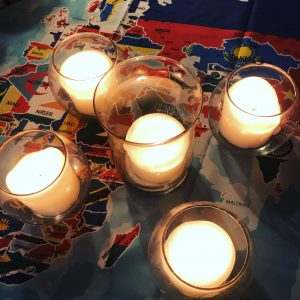
Each time we gather we light candles and pray together:
Lord we ask you to fill us with your Hope, Lord, fill us with your Peace,
Lord fill us with your Joy, Lord fill us with your Love, And Lord Help us to see your Light! AMEN
Lighting candles helps us focus our hearts and minds and our attention on God. TAKE TIME TO LIGHT A CANDLE and focus your attention on Jesus and ask him to fill you with his hope, peace, joy and love today.
Then we do a body prayer practice, cupping our hands like we are holding something in them. I invite everyone to cup their hands and imagine all the heavy things they are carrying and then imagine giving these things over to Jesus to carry.
GIVING STUFF TO JESUS to HOLD FOR US: (body prayer practice) We are all carrying many heavy things today… let us give them to God to hold and carry for us. Cup your hands in front of you and imagine all the heavy things your are holding…feel the weight. Picture these things. Name them. Now reach your hands across and put these things into the hands of Jesus to hold. Actually Give these things to Jesus to hold and carry for you today. And know HE will hold them and be in charge of them, so you don’t have to carry them anymore. 
Next, we read a psalm out loud together as a prayer. We listen to the psalm and allow the Holy Spirit to speak to us through it.
PSALM 147 NIV
Praise the Lord. Praise the Lord, my soul.
I will praise the Lord all my life; I will sing praise to my God as long as I live. Do not put your trust in princes, in human beings, who cannot save. When their spirit departs, they return to the ground;
On that very day their plans come to nothing. Blessed are those whose help is the God of Jacob, whose hope is in the Lord their God.
He is the Maker of heaven and earth, the sea, and everything in them—he remains faithful forever. He upholds the cause of the oppressed and gives food to the hungry. The Lord sets prisoners free,
the Lord gives sight to the blind, the Lord lifts up those who are bowed down,
the Lord loves the righteous. The Lord watches over the foreigner and sustains the fatherless and the widow, but he frustrates the ways of the wicked.
The Lord reigns forever, your God, O Zion, for all generations.
Praise the Lord. AMEN
WHAT WORD OR PHRASE stands out to you? What gives you hope today? Scott Erickson’s TRINITY
Scott Erickson’s TRINITY
LISTEN TO THE GOSPEL: We then listen to the gospel passage read in three versions by three different voice. We allow the Holy Spirit to be our teacher and listen to what God is speaking to us about today. (Lectio Divina) If you are doing this practice on your own, you can use the audio feature on Bible Gateway to listen to the passage rather than just reading it.
This week we continued our study of Acts 2 looking at the arrival of the Holy Spirit and how this changed everything for the followers of Jesus. You can read the three versions here.
QUESTIONS TO CONSIDER… we have time to reflect on the passage and I provide questions to reflect on or journal from on their own.
QUESTIONS TO CONSIDER and Journal from this week:
What do you notice that you haven’t noticed before? What is God speaking to you about TODAY as you read these passages? Take time to read them again, use different translations to hear it in fresh ways.
What questions do you have? What questions come up as you read the passage? Talk to Jesus about them.
How does the psalm reflect God’s heart for justice?
When we read and listen to Acts 2 in light of what is happening in our world today, what do you hear? What do you notice?
When they heard this they were crushed and realized what they had done to Jesus. Deeply moved, they said to Peter and the other apostles, “What do we need to do, brothers?”
Since everyone bears the image of Jesus, what do we need to do in response to how we’ve treated others?
Especially how we’ve treated people of color, or people who aren’t like us, or people we disagree with politically.
ACTS 2:42 -45 What do you notice about how the new church acted? How did they choose to live and work together?
What are some ways our community, or the church community you are a part of, can live out the NEW way of church together and in the world? 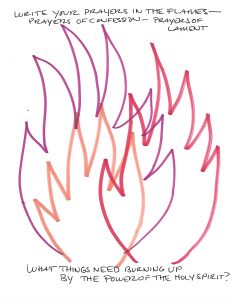 And finally, we do a prayer response together. The Holy Spirit arrived on Pentecost with tongues of fire.
And finally, we do a prayer response together. The Holy Spirit arrived on Pentecost with tongues of fire.
IN RESPONSE TO ALL THAT has gone on this week: What things need burning up by the power of the HOLY SPIRIT? What things do you need to grieve or lament? Write these on the flames. Write your prayers of confession. Then take the time to give these to Jesus. You can even burn them in your fireplace, grill or firepit depending upon your location.
We end by praying our closing prayer together and then blowing out the candles… taking with us God’s HOPE, God’s PEACE, God’s JOY, God’s LOVE and asking JESUS to help us shine his LIGHT to the World!
CLOSING PRAYER:
Lord! Give us grace today to love as you love. Help us to love with extravagance. Give us hope today for ourselves and others. Heal our hurts and our hearts today, so we can serve and help those around us. Help us to know that you are enough. And help us live today and everyday in thankfulness.
For all you’ve done, and for all you bless us with. In the Name of the Father, the Son, and the Holy Spirit. AMEN.
You’d be welcome to join us at thinplaceNASHVILLE either Tuesday nights at 7pm central time or on Fridays at 1pm central time via Zoom. We also gather on Sunday nights but take a break in the summer. Just send me an email or follow me on facebook for more information .
Here’s the Flames Hand Out you can print out and pray with :
©lillylewin and freerangeworship.com
As an Amazon Associate, I receive a small amount for purchases made through appropriate links.
Thank you for supporting Godspace in this way.
When referencing or quoting Godspace Light, please be sure to include the Author (Christine Sine unless otherwise noted), the Title of the article or resource, the Source link where appropriate, and ©Godspacelight.com. Thank you!

